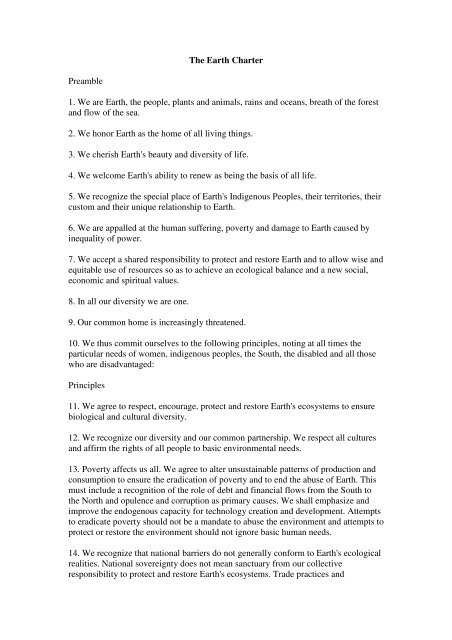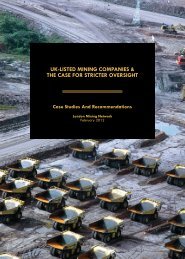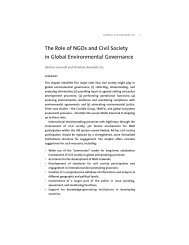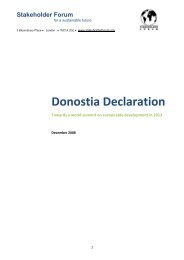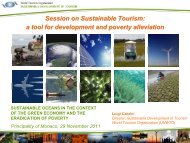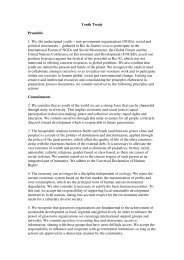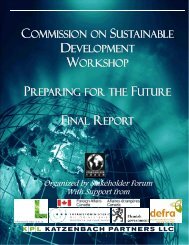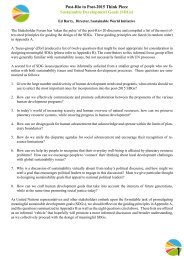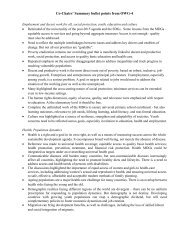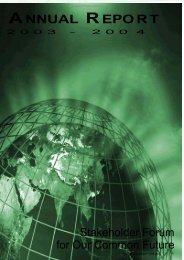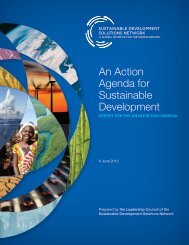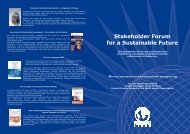The Earth Charter Preamble 1. We are Earth, the people, plants and ...
The Earth Charter Preamble 1. We are Earth, the people, plants and ...
The Earth Charter Preamble 1. We are Earth, the people, plants and ...
You also want an ePaper? Increase the reach of your titles
YUMPU automatically turns print PDFs into web optimized ePapers that Google loves.
<strong>The</strong> <strong>Earth</strong> <strong>Charter</strong><br />
<strong>Preamble</strong><br />
<strong>1.</strong> <strong>We</strong> <strong>are</strong> <strong>Earth</strong>, <strong>the</strong> <strong>people</strong>, <strong>plants</strong> <strong>and</strong> animals, rains <strong>and</strong> oceans, breath of <strong>the</strong> forest<br />
<strong>and</strong> flow of <strong>the</strong> sea.<br />
2. <strong>We</strong> honor <strong>Earth</strong> as <strong>the</strong> home of all living things.<br />
3. <strong>We</strong> cherish <strong>Earth</strong>'s beauty <strong>and</strong> diversity of life.<br />
4. <strong>We</strong> welcome <strong>Earth</strong>'s ability to renew as being <strong>the</strong> basis of all life.<br />
5. <strong>We</strong> recognize <strong>the</strong> special place of <strong>Earth</strong>'s Indigenous Peoples, <strong>the</strong>ir territories, <strong>the</strong>ir<br />
custom <strong>and</strong> <strong>the</strong>ir unique relationship to <strong>Earth</strong>.<br />
6. <strong>We</strong> <strong>are</strong> appalled at <strong>the</strong> human suffering, poverty <strong>and</strong> damage to <strong>Earth</strong> caused by<br />
inequality of power.<br />
7. <strong>We</strong> accept a sh<strong>are</strong>d responsibility to protect <strong>and</strong> restore <strong>Earth</strong> <strong>and</strong> to allow wise <strong>and</strong><br />
equitable use of resources so as to achieve an ecological balance <strong>and</strong> a new social,<br />
economic <strong>and</strong> spiritual values.<br />
8. In all our diversity we <strong>are</strong> one.<br />
9. Our common home is increasingly threatened.<br />
10. <strong>We</strong> thus commit ourselves to <strong>the</strong> following principles, noting at all times <strong>the</strong><br />
particular needs of women, indigenous <strong>people</strong>s, <strong>the</strong> South, <strong>the</strong> disabled <strong>and</strong> all those<br />
who <strong>are</strong> disadvantaged:<br />
Principles<br />
1<strong>1.</strong> <strong>We</strong> agree to respect, encourage, protect <strong>and</strong> restore <strong>Earth</strong>'s ecosystems to ensure<br />
biological <strong>and</strong> cultural diversity.<br />
12. <strong>We</strong> recognize our diversity <strong>and</strong> our common partnership. <strong>We</strong> respect all cultures<br />
<strong>and</strong> affirm <strong>the</strong> rights of all <strong>people</strong> to basic environmental needs.<br />
13. Poverty affects us all. <strong>We</strong> agree to alter unsustainable patterns of production <strong>and</strong><br />
consumption to ensure <strong>the</strong> eradication of poverty <strong>and</strong> to end <strong>the</strong> abuse of <strong>Earth</strong>. This<br />
must include a recognition of <strong>the</strong> role of debt <strong>and</strong> financial flows from <strong>the</strong> South to<br />
<strong>the</strong> North <strong>and</strong> opulence <strong>and</strong> corruption as primary causes. <strong>We</strong> shall emphasize <strong>and</strong><br />
improve <strong>the</strong> endogenous capacity for technology creation <strong>and</strong> development. Attempts<br />
to eradicate poverty should not be a m<strong>and</strong>ate to abuse <strong>the</strong> environment <strong>and</strong> attempts to<br />
protect or restore <strong>the</strong> environment should not ignore basic human needs.<br />
14. <strong>We</strong> recognize that national barriers do not generally conform to <strong>Earth</strong>'s ecological<br />
realities. National sovereignty does not mean sanctuary from our collective<br />
responsibility to protect <strong>and</strong> restore <strong>Earth</strong>'s ecosystems. Trade practices <strong>and</strong>
transnational corporations must not cause environmental degradation <strong>and</strong> should be<br />
controlled in order to achieve social justice, equitable trade <strong>and</strong> solidarity with<br />
ecological principles.<br />
15. <strong>We</strong> reject <strong>the</strong> build up <strong>and</strong> use of military force <strong>and</strong> <strong>the</strong> use of economic pressure<br />
as means of resolving conflict. <strong>We</strong> commit ourselves to pursue genuine peace, which<br />
is not merely <strong>the</strong> absence of war but includes <strong>the</strong> eradication of poverty, <strong>the</strong><br />
promotion of social justice <strong>and</strong> economic, spiritual, cultural <strong>and</strong> ecological wellbeing.<br />
16. <strong>We</strong> agree to ensure that decision-making processes <strong>and</strong> <strong>the</strong>ir criteria <strong>are</strong> clearly<br />
defined, transp<strong>are</strong>nt, explicit, accessible <strong>and</strong> equitable. Those whose decisions or<br />
activities may affect <strong>the</strong> environment must first prove <strong>the</strong> absence of harm. Those<br />
likely to be affected, particularly populations in <strong>the</strong> South <strong>and</strong> those in subjugation<br />
within existing States, should have free access to information <strong>and</strong> effectively<br />
participate in <strong>the</strong> decision-making processes.<br />
17. State, institutions, corporations <strong>and</strong> <strong>people</strong>s <strong>are</strong> unequal in <strong>the</strong>ir contribution to<br />
environmental harm, experience of ecological degradation <strong>and</strong> ability to respond to<br />
environmental destruction. While all <strong>are</strong> responsible for improving environmental<br />
quality, those who have expropriated or consumed <strong>the</strong> majority of <strong>Earth</strong>'s resources or<br />
who continue to do so must cease such expropriation or reduce such consumption <strong>and</strong><br />
must bear <strong>the</strong> costs of ecological restoration <strong>and</strong> protection by providing <strong>the</strong> majority<br />
of financial <strong>and</strong> technological resources.<br />
18. Women constitute over half of <strong>Earth</strong>'s human population. <strong>The</strong>y <strong>are</strong> a powerful<br />
source for change. <strong>The</strong>y contribute more than half <strong>the</strong> effort to human welf<strong>are</strong>. Men<br />
<strong>and</strong> women agree that women's status in decision-making <strong>and</strong> social processes must<br />
equitably reflect <strong>the</strong>ir contribution. <strong>We</strong> must shift from a society dominated by men to<br />
one which more accurately reflects <strong>the</strong> valued contributions of men <strong>and</strong> women to<br />
human <strong>and</strong> ecological welf<strong>are</strong>.<br />
19. <strong>We</strong> have come to realize that <strong>the</strong> threats to <strong>the</strong> biosphere which sustains all life on<br />
<strong>Earth</strong> have increased in rate, magnitude <strong>and</strong> scale to such extent that inaction would<br />
be negligent.<br />
<strong>Earth</strong> <strong>Charter</strong> Action Plan<br />
20. <strong>We</strong> shall adopt <strong>the</strong> spirit <strong>and</strong> principles of <strong>the</strong> <strong>Earth</strong> <strong>Charter</strong> at <strong>the</strong> individual level<br />
<strong>and</strong> through concrete actions within our Non-Governmental Organizations.<br />
2<strong>1.</strong> <strong>We</strong> will use existing mechanisms <strong>and</strong>/or create an international network of <strong>the</strong><br />
signatories hereto to disseminate <strong>the</strong> <strong>Earth</strong> <strong>Charter</strong> as principles for action at <strong>the</strong> local,<br />
national <strong>and</strong> global level.<br />
22. <strong>The</strong> <strong>Earth</strong> <strong>Charter</strong> shall be translated into all <strong>the</strong> languages of <strong>Earth</strong>.<br />
23. <strong>We</strong> shall commit ourselves to <strong>the</strong> preparation of "Objective 1995" by which <strong>the</strong><br />
United Nations will celebrate its 50th anniversary at which time we want <strong>the</strong>m to<br />
adopt this <strong>Earth</strong> <strong>Charter</strong>.
24. Non-Governmental Organizations worldwide shall initiate a combined campaign<br />
"<strong>We</strong> Are <strong>Earth</strong>" through to 1995 <strong>and</strong> <strong>the</strong> adoption of this <strong>Earth</strong> <strong>Charter</strong> by <strong>the</strong> United<br />
Nations.<br />
25. Every individual, organization, corporation <strong>and</strong> state shall dedicate a percentage<br />
of <strong>the</strong>ir operating budget <strong>and</strong> <strong>the</strong>ir profit as an "<strong>Earth</strong> Percentage" dedicated to <strong>the</strong><br />
restoration, protection <strong>and</strong> management of <strong>Earth</strong>'s ecosystems <strong>and</strong> <strong>the</strong> promotion of<br />
equitable development.<br />
26. <strong>We</strong> call for a second Global Forum to be held in 1999 to evaluate <strong>and</strong> reaffirm our<br />
commitment to <strong>the</strong> relationships made, <strong>the</strong> accomplishment achieved <strong>and</strong> <strong>the</strong> goals<br />
sought at this 1992 Global Forum.<br />
27. <strong>We</strong> agree to abide by this <strong>Earth</strong> <strong>Charter</strong> throughout our lives.


